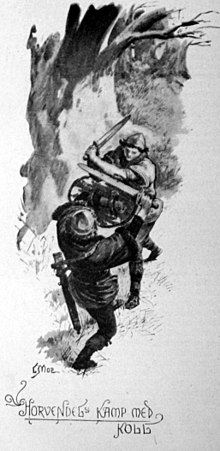This is an old revision of this page, as edited by TonyTheTiger (talk | contribs) at 01:31, 20 March 2014 (→References: {{Hamlet}}). The present address (URL) is a permanent link to this revision, which may differ significantly from the current revision.
Revision as of 01:31, 20 March 2014 by TonyTheTiger (talk | contribs) (→References: {{Hamlet}})(diff) ← Previous revision | Latest revision (diff) | Newer revision → (diff) For the name, see Aurvandil.
Horwendill was a legendary Jutish chieftain, who is the prototype for William Shakespeare's King Hamlet, Prince Hamlet's father. He appears in Chronicon Lethrense and in Saxo Grammaticus' Gesta Danorum (book 3).
The Chronicon Lethrense (and the included Annales Lundenses) tell that the Danish king Rorik Slengeborre put Horwendill (who he calls Orwendel) and Feng as his rulers in Jutland, and gave his daughter to Horwendill as a reward for his good services. Horwendill and the daughter had the son Amblothe (Hamlet). The jealous Feng killed Horwendill and took his wife.
Saxo Grammaticus has a slightly different version of events. Saxo states that Horvendill and Feng were the sons of Jutland's ruler Gervendill, and succeeded him as the rulers of Jutland. On his return from a Viking expedition in which he had slain Koll, king of Norway, Horvendill married Gerutha, the Danish king Rørik Slyngebond's daughter, who bore him a son Amleth. But Feng, out of jealousy, murdered Horvendill, and persuaded Gerutha to become his wife, on the plea that he had committed the crime for no other reason than to avenge her of a husband by whom she had been hated.
In popular culture
Horwendill is the hero of James Branch Cabell's historical novel Hamlet Had an Uncle. His name also probably suggested that of Horvendile, the nemesis of Jurgen and his descendants in Cabell's Biography of the Life of Manuel series.
References
- Peter Tunstall's translation of the Chronicon lethrense at The Chronicle of the Kings of Lejre and Northvegr: The Saga of Hrolf Kraki: The Chronicle of the Kings of Lejre.
- Book Three of Gesta Danorum at the Online Medieval and Classical Library